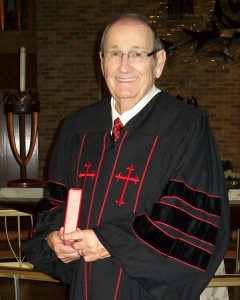
Everywhere you turn, you run into rhetoric about the latest killing or political situation or racism. Bad things always seem to make the news, and it’s easy to get a warped view of today’s world. I’m not blind to the evil in the world; I’m saying we have to be careful not to let it color our entire life-experience. It’s easy to allow a few mentally ill or hate-filled prejudiced people define life in America. There’s a much better way.
Thank God we still have multitudes of Good Samaritans today—people who will go out of their way to help others, regardless of the color of their skin or their belief system. Furthermore, the influence of the words of Jesus of Nazareth give us hope for the future, whether we allow ourselves to be hopeful or whether or not we accept Him as the Messiah. Agape love will never go out of style. It’s put into practice by millions, even those not listed as Christians. Labels don’t mean all that much, anyway.
Years ago, a friend gave me a painting of someone’s interpretation of Christ. I’ve never seen much religious art that I really like. Anyway, this Jesus was portrayed in pastel colors, rather pale, with baby blue eyes and an overly-sweet smile. I appreciate the gesture, but not that interpretation of Jesus. That doesn’t fit the one who went against the establishment. He said, “Woe to you scribes and Pharisees, hypocrites, because you cleanse the outside of the cup and inside you are full of corruption. You are like whitewashed tombs, which outwardly appear beautiful, but within, you are filled with dead men’s bones,” (Matthew 23:27). He also said, “Those who live by the sword will perish by the sword,” (Matthew 26:52).
Yet, Jesus also had a huge compassion for the poor, the neglected, and the sick of mind and body. He said, “Come unto me all you that labor and are heavy laden, and I will give you rest.” In three short years, he ministered to the young, old, crippled, diseased, and confused. I believe we have to interpret Christ for ourselves. Who is Christ for me? For you? What difference has he made in your life? It’s a deeply personal thing. But however we interpret Him, He is still the answer to many of life’s problems and difficulties.
When I was pastor of the Broadmoor UMC in Baton Rouge, I went to church early one Sunday morning, only to find four young people asleep under the covered walk outside the educational building. They didn’t seem to be embarrassed nor apologetic. They (three men and one woman) were dressed in long white gowns, wearing sandals, etc., looking like something out of Jerusalem in the first century. I invited them in for coffee and donuts, and they accepted. “Where are you folks going?” I asked. “Down the road,” came the answer. “Where have you been?” “Different places.” “Uh, what do you call yourselves?” “Children of God,” they said. My last question to them: “Well, what is your purpose?” “To follow Jesus the best we can,” they said in unison.
We talked a few more minutes, they ate and left, thanking me for my hospitality. It changed my sermon that day. Is this what it means to follow Christ? I don’t think so. Wearing sandals and robes have very little to do with the faith that one lives by. If we want to follow Christ, it means that we love the unlovable and forgive the unforgivable. It means that we live and help live. It means that we treat people even better than we want them to treat us.
So, who is this Christ to you? For man, He is the champion of courage, change and freedom. Writers have tried to describe Him, but none has ever done Him justice. Millions have tried to follow Him, but none have succeeded completely. He is ever beyond us. His goodness baffles us. His love will not let us go.
I would like to conclude by using one of my favorite quotes:
“He was born in an obscure village.
He worked in a carpenter shop until He was thirty.
He then became an itinerant preacher.
He never held an office.
He never had a family or owned a house.
He didn’t go to college.
He had no credentials but himself.
Nineteen centuries have come and gone, and today,
He is the central figure of the human race.
All the armies that ever marched,
All the navies that ever said,
All the parliaments that ever sat,
And all the kings that ever reigned have not affected
The life of people on this earth as much as that
One solitary life.”









